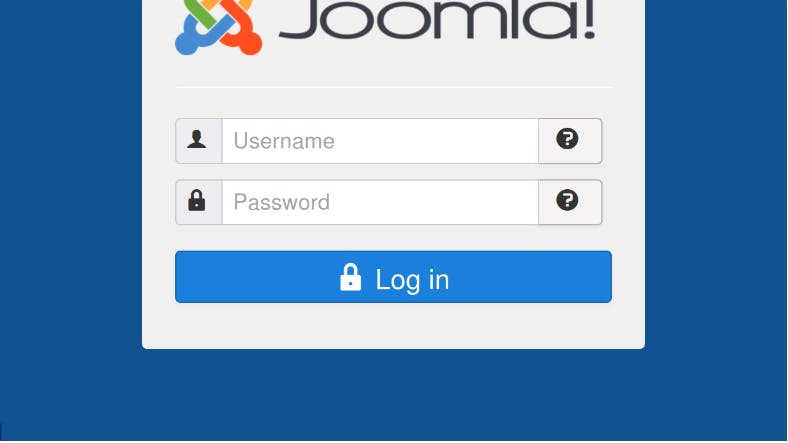With over 84 million downloads, Joomla! is one of the most popular content management systems. We detected a previously unknown LDAP injection vulnerability in the login controller. This one vulnerability could allow remote attackers to leak the super user password and to fully take over any Joomla! <= 3.7.5 installation that uses LDAP for authentication.
Requirements - Who is affected
Joomla! powers about 3.3% of all websites’ content and articles. Installations with the following requirements are affected by this vulnerability:
- Joomla! version 1.5 <= 3.7.5 is installed
- Joomla! is configured to use LDAP for authentication
This is not a configuration flaw and an attacker does not need any privileges to exploit this vulnerability.
Impact - What can an attacker do
By exploiting a vulnerability in the login page, an unprivileged remote attacker can efficiently extract all authentication credentials of the LDAP server that is used by the Joomla! installation. These include the username and password of the super user, the Joomla! administrator. An attacker can then use the hijacked information to login to the administrator control panel and to take over the Joomla! installation, as well as potentially the web server, by uploading custom Joomla! extensions for remote code execution.
Vulnerability Analysis - CVE-2017-14596
We identified a vulnerability that spans over the following nested code lines. First, in the LoginController the Joomla! application receives the user-supplied credentials from the login form in line 62.
/administrator/components/com_login/controller.php
54 class LoginController extends JControllerLegacy
55 {
56 public function login()
57 {
58 ⋮
59 $app = JFactory::getApplication();
60 ⋮
61 $model = $this->getModel('login');
62 $credentials = $model->getState('credentials');
63 ⋮
64 $app->login($credentials, array('action' => 'core.login.admin'));
65 }
66 }The credentials are passed on to the login method which then invokes the authenticate method.
/libraries/cms/application/cms.php
857 class JApplicationCms extends JApplicationWeb
858 {
859 public function login($credentials, $options = array())
860 {
861 ⋮
862 $authenticate = JAuthentication::getInstance();
863 $authenticate->authenticate($credentials, $options);
864 }
865 }/libraries/joomla/authentication/authentication.php
279 class JAuthentication extends JObject
280 {
281 public function authenticate($credentials, $options = array())
282 {
283 ⋮
284 $plugin->onUserAuthenticate($credentials, $options, $response);
285 }
286 }Based on the plugin that is used for authentication, the authenticate method passes the credentials to the onUserAuthenticate method. If Joomla! is configured to use LDAP for authentication, the LDAP plugin’s method is invoked.
/plugins/authentication/ldap/ldap.php
109 class PlgAuthenticationLdap extends JPlugin
110 {
111 public function onUserAuthenticate($credentials, $options, &$response)
112 {
113 ⋮
114 $userdetails = $ldap->simple_search(
115 str_replace(
116 '[search]',
117 $credentials['username'],
118 $this->params->get('search_string')
119 )
120 );
121 }
122 }In the LDAP plugin, the username credential (line 117) is embedded into the LDAP query as specified in the search_string option. According to the official Joomla! documentation, the search_string configuration option is “a query string used to search for the user, where [search] is directly replaced by search text from the login field”, for example “uid=[search]“. The LDAP query is then passed to the simple_search method of the LdapClient which connects to the LDAP server and performs the ldap_search.
/libraries/vendor/joomla/ldap/src/LdapClient.php
1 class LdapClient
2 {
3 public function simple_search($search)
4 {
5 $results = explode(';', $search);
6 foreach ($results as $key => $result)
7 {
8 $results[$key] = '(' . $result . ')';
9 }
10 return $this->search($results);
11 }
12
13 public function search(array $filters, ...)
14 {
15 foreach ($filters as $search_filter)
16 {
17 $search_result = @ldap_search($res, $dn, $search_filter, $attr);
18 ⋮
19 }
20 }
21 }Proof Of Concept - Blind LDAP Injection
The lack of input sanitization of the username credential used in the LDAP query allows an adversary to modify the result set of the LDAP search. By using wildcard characters and by observing different authentication error messages, the attacker can literally search for login credentials progressively by sending a row of payloads that guess the credentials character by character.
XXX;(&(uid=Admin)(userPassword=A*))
XXX;(&(uid=Admin)(userPassword=B*))
XXX;(&(uid=Admin)(userPassword=C*))
...
XXX;(&(uid=Admin)(userPassword=s*))
...
XXX;(&(uid=Admin)(userPassword=se*))
...
XXX;(&(uid=Admin)(userPassword=sec*))
...
XXX;(&(uid=Admin)(userPassword=secretPassword))Each of these payloads yield exactly one out of two possible states which allow an adversary to abuse the server as an Oracle. A filter bypass is necessary for exploitation that is not covered in this blog post. With an optimized version of these payloads one bit per request can be extracted from the LDAP server which results in a highly efficient blind LDAP injection attack.
Timeline
| Date | What |
| 2017/07/27 | Provided vulnerability details and PoC to vendor |
| 2017/07/29 | Vendor confirmed security issue |
| 2017/09/19 | Vendor released fixed version |
Summary
As one of the most popular open source CMS applications, Joomla! receives many code reviews from the security community. Yet alone one missed security vulnerability in the 500,000 lines of code can lead to a server compromise. With the help of static code analysis, we detected a critical LDAP injection vulnerability (CVE-2017-14596) that remained undiscovered for over 8 years. The vulnerability allows an attacker to steal login credentials from Joomla! installations that use LDAP authentication.
We would like to thank the Joomla! Security Strike Team for an excellent coordination and remediation of this issue and recommend to update to the latest Joomla! version 3.8 immediately.
Related Posts
- Exploiting Hibernate Injections
- Backend SQL Injection in BigTree CMS 4.4.6
- dotCMS 5.1.5: Exploiting H2 SQL injection to RCE
- Joomla! 3.8.3: Privilege Escalation via SQL Injection
- CubeCart 6.1.12 - Admin Authentication Bypass
- Pre-Auth Takeover of OXID eShops
- Breaking Into Your Company's Internal Network - SuiteCRM 7.11.4


